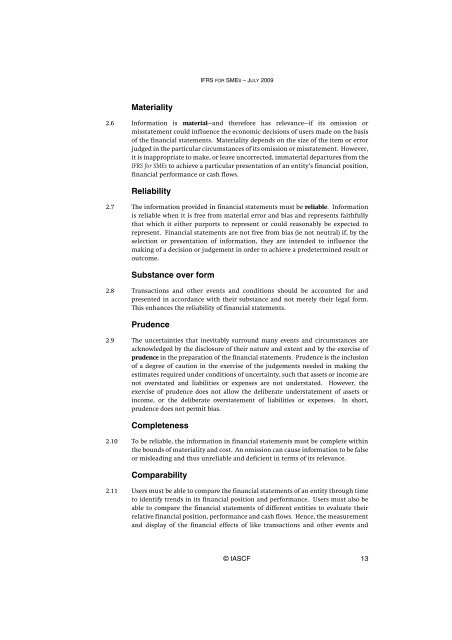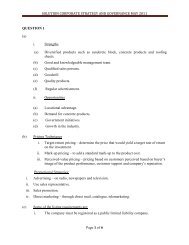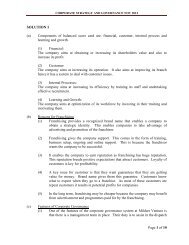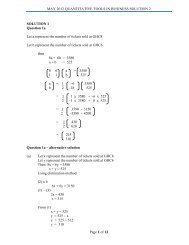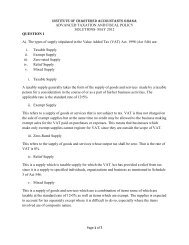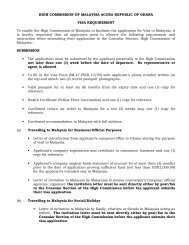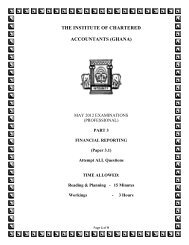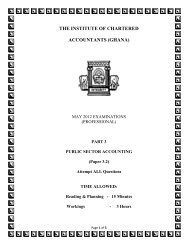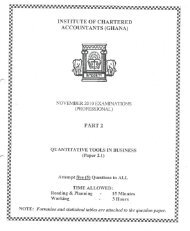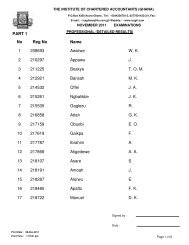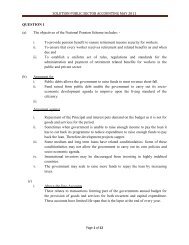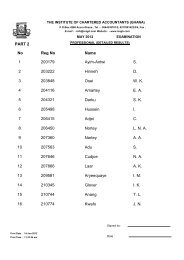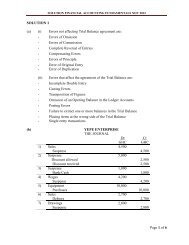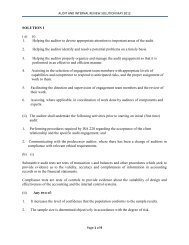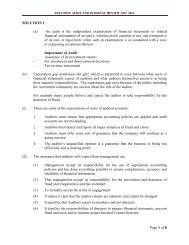(IFRS) for Small and Medium-sized Entities (SMEs)
(IFRS) for Small and Medium-sized Entities (SMEs)
(IFRS) for Small and Medium-sized Entities (SMEs)
Create successful ePaper yourself
Turn your PDF publications into a flip-book with our unique Google optimized e-Paper software.
<strong>IFRS</strong> FOR SMES – JULY 2009Materiality2.6 In<strong>for</strong>mation is material—<strong>and</strong> there<strong>for</strong>e has relevance—if its omission ormisstatement could influence the economic decisions of users made on the basisof the financial statements. Materiality depends on the size of the item or errorjudged in the particular circumstances of its omission or misstatement. However,it is inappropriate to make, or leave uncorrected, immaterial departures from the<strong>IFRS</strong> <strong>for</strong> <strong>SMEs</strong> to achieve a particular presentation of an entity’s financial position,financial per<strong>for</strong>mance or cash flows.Reliability2.7 The in<strong>for</strong>mation provided in financial statements must be reliable. In<strong>for</strong>mationis reliable when it is free from material error <strong>and</strong> bias <strong>and</strong> represents faithfullythat which it either purports to represent or could reasonably be expected torepresent. Financial statements are not free from bias (ie not neutral) if, by theselection or presentation of in<strong>for</strong>mation, they are intended to influence themaking of a decision or judgement in order to achieve a predetermined result oroutcome.Substance over <strong>for</strong>m2.8 Transactions <strong>and</strong> other events <strong>and</strong> conditions should be accounted <strong>for</strong> <strong>and</strong>presented in accordance with their substance <strong>and</strong> not merely their legal <strong>for</strong>m.This enhances the reliability of financial statements.Prudence2.9 The uncertainties that inevitably surround many events <strong>and</strong> circumstances areacknowledged by the disclosure of their nature <strong>and</strong> extent <strong>and</strong> by the exercise ofprudence in the preparation of the financial statements. Prudence is the inclusionof a degree of caution in the exercise of the judgements needed in making theestimates required under conditions of uncertainty, such that assets or income arenot overstated <strong>and</strong> liabilities or expenses are not understated. However, theexercise of prudence does not allow the deliberate understatement of assets orincome, or the deliberate overstatement of liabilities or expenses. In short,prudence does not permit bias.Completeness2.10 To be reliable, the in<strong>for</strong>mation in financial statements must be complete withinthe bounds of materiality <strong>and</strong> cost. An omission can cause in<strong>for</strong>mation to be falseor misleading <strong>and</strong> thus unreliable <strong>and</strong> deficient in terms of its relevance.Comparability2.11 Users must be able to compare the financial statements of an entity through timeto identify trends in its financial position <strong>and</strong> per<strong>for</strong>mance. Users must also beable to compare the financial statements of different entities to evaluate theirrelative financial position, per<strong>for</strong>mance <strong>and</strong> cash flows. Hence, the measurement<strong>and</strong> display of the financial effects of like transactions <strong>and</strong> other events <strong>and</strong>© IASCF 13


